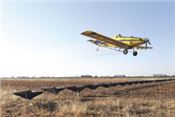|
Multiple Databases Available To Help Arkansas Pesticide Applicators Avoid Sensitive Crops, Beehives

CropCheck allows row crop producers to submit crop site information.
Pesticide applicators can use the information to help determine the scope and location of
herbicide-sensitive crops, and plan their approach accordingly.
LITTLE ROCK, ARK.
Arkansas pesticide applicators working row and field crops now have a powerful tool to help them better avoid unintentional spraying over herbicide-sensitive crops and beehives.
Now in its second year of operation in Arkansas, CropCheckTM, which began as a 2018 pilot program offered in partnership between FieldWatch® and the University of Arkansas System Division of Agriculture, is one of three online databases available to growers at no cost. Arkansas is one of more than 20 participating states.
FieldWatch is a not-for-profit company that hosts online registries that map locations of pesticide-sensitive crops and beehives. The registries include CropCheck, which documents row crops, DriftwatchTM, which documents specialty crops, and BeeCheckTM, which documents beehives. Recently, 17 states, including Arkansas, have opted to add industrial hemp to their respective registry maps. Saskatchewan, Canada, has also added industrial hemp.
CropCheck allows row crop producers to submit crop site information. Pesticide applicators can use the information to help determine the scope and location of herbicide-sensitive crops, and plan their approach accordingly.
DriftWatch allows commercial producers of specialty crops such as tomatoes, fruit trees, grapes and organic crops to register and map their sites online with an easy-to-use mapping tool, and to provide contact information about their operation.
BeeCheck has a few additional features for beekeepers and apiaries to communicate their location and site details to applicators.
Registered applicators can sign up to receive email notifications when new crop fields or beehives are added to their designated state, county or areas.
Vic Ford, associate director of Agriculture and Natural Resources for the Division of Agriculture, said the registries provide an invaluable tool for protecting a wide spectrum of agricultural endeavors throughout the state.
“This is our third year with FieldWatch, and the one thing we have learned is that it is not only a row crop, specialty crop, or beekeeper program,” Ford said. “It is encompassing all three. For row crops and specialty crops, it is imperative that the applicators know where your sensitive crops are. This is the mechanism to do so. By registering hives, it helps to prevent application of bee-toxic chemicals to the hive area.”
Bob Walters, director of business development for FieldWatch, said there are now at least 283 producers and at least 147 pesticide applicators registered with the program in Arkansas. Ford said there were 166,000 acres of Arkansas cropland registered through the program in 2019.
All FieldWatch registries can be accessed through laptop and desktop computers via the Internet. FieldWatch has also developed mobile apps for beekeepers and pesticide applicators that will function on both Android and iOS devices.
Producers interested in participating in CropCheck, DriftWatch or BeeCheck can register their respective fields at the following sites:
• BeeCheck (apiarists): https://beecheck.org
• DriftWatch (specialty crops): https://driftwatch.org
• CropCheck (row crops): ar.cropcheck.org/login
To register as an applicator, visit https://fieldwatch.com. ∆
|
|